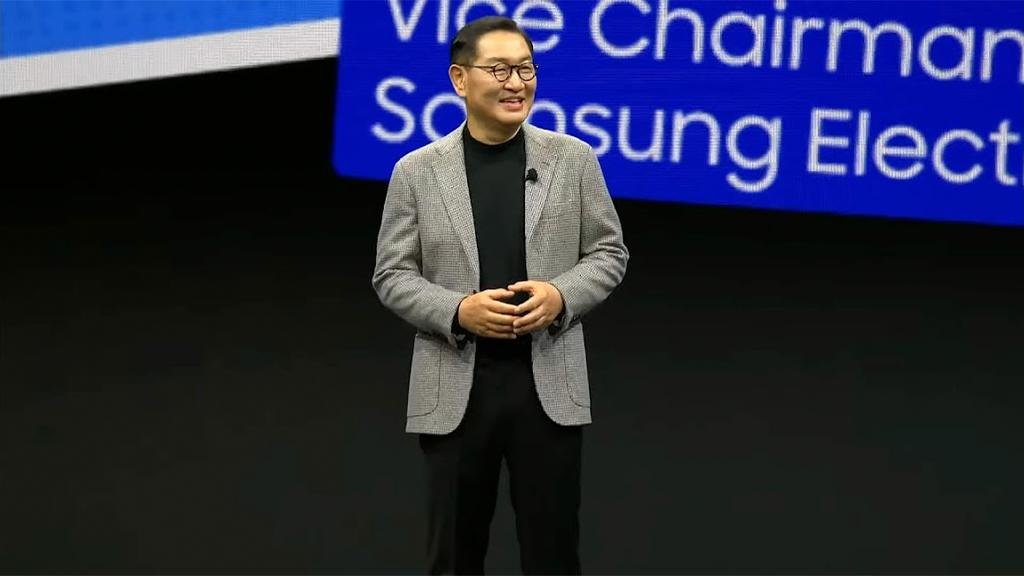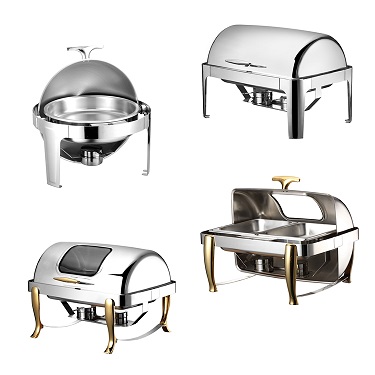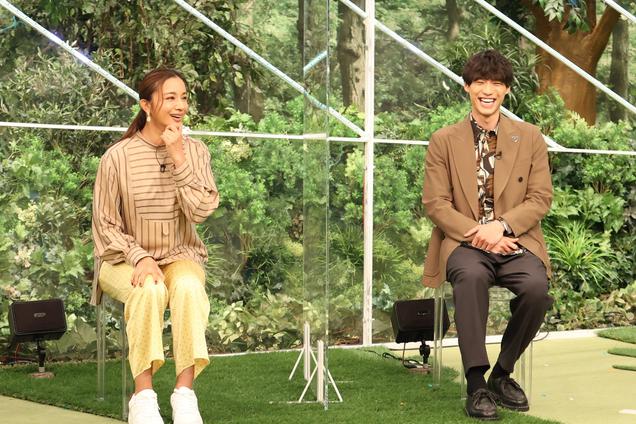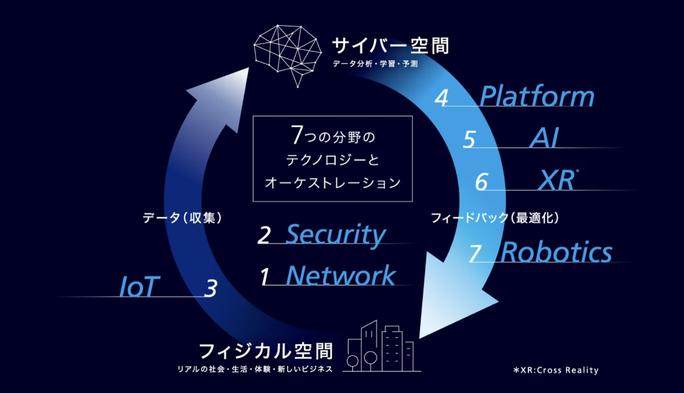Samsung, Innovation in Product Life Cycle for the Future-CES2022 Report 1 | IoT NEWS
The keynote for CES2022 kicked off at Samsung. Samsung, which has become a leader in the consumer electronics industry since becoming the world's number one TV sales share (*) in 2006, has become the center of CES.
CES is said to be a place to visualize the technology trends of the year, but Samsung's announcement has had a great influence on the past 10 years. Samsung has communicated new trend areas and keywords created by technology, such as smart TVs in 2011, IoT in 2015, and personalization in 2020, and the value that technology brings.
* No. 1 in the world TV sales share for 16 consecutive years including 2021. (Survey by British research company Omdia)
In his keynote, the face of CES that year, Samsung's vice chairman and co-CEO Han Jung-hee took the stage to convey the technology trends of 2022.
Samsung will be on stage following 2015 and 2020.
At CES2020, which was held just before the Korona-ka, one of the keywords announced by Samsung was "Personalized Experience," which was positioned as the value of technology to be optimized for each individual. In fact, various products are equipped with sensors that grasp the situation and AI that optimizes from trends, etc., and the flow of "optimizing for each individual" is clear, and evolution is progressing with that vector even now. There is.
However, the situation in the world changed completely immediately after CES2020. CES2021 will be an online event by Corona, and it will be the most important for the company to take responsibility for solving "social issues" such as environment and disparity problems rather than "individual optimization", and the direction of evolution. A big shift in sex has come to be required.
Under these circumstances, Samsung has set a vision of "Together for tomorrow" and called on the world to build a sustainable future together. The core concept of this vision is "everyday sustainability," which means that consumers will be individually optimized, the environmental burden will be reduced in a comfortable life, and sustainability will be part of the product experience. It's a way of thinking.
Sustainability initiatives
For example, the enhanced Solar Cell Remote supports RF Energy harvesting, which charges from the Wi-Fi router's radio frequency energy (RF Energy), in addition to the traditional day and night rechargeable solar panels. Since the remote control operates with weak power, the solar cell remote does not have a lithium-ion battery, and by including such a remote control in many of our own products, more than 200 million units can be installed from the landfill. The goal is to eliminate the batteries.
Users will be more comfortable than ever without the hassle of charging, let alone battery replacement. In addition, the new product is equipped with a function to reduce the standby power consumption of TV and smartphone chargers to zero, and it is said that all of its products will have zero standby power consumption by 2025.
Samsung has a mechanism to process the cardboard that used to pack products into cat houses and side tables and continue to use it, and an upcycle that uses smartphones that are no longer used after changing models as a baby watching tool. Was proposing.
All the packaging materials for TVs released in 2021 were already recycled materials, but in the future, we will change the packaging materials such as Styrofoam and box holders to recycled materials, including products other than TVs.
We are also promoting the adoption of recycled materials for product materials. So far, we have adopted recycled materials for bespoke refrigerators (refrigerators that users can customize to finish the kitchen like built-in appliances), wireless earphones, and QLED TVs, but by 2025, the use of recycled materials will be mobile. It aims to expand to all equipment and home appliances.
In addition, efforts are being made to reduce carbon dioxide emissions throughout the product production cycle, and in-house memory chips are contributing to the reduction of carbon dioxide emissions by approximately 700,000 tons.
E-waste (waste of electrical and electronic equipment: used electrical and electronic equipment such as TVs and personal computers that are disassembled, recycled or disposed of without being used) is also a major issue for the industry, so Samsung 2009 Since the year, it has collected more than 5 million tons of E-waste, which is about twice the amount of electronic waste in Japan.
It is necessary to promote effective utilization including recycling.
Against this background, Samsung launched last year a sustainability platform "Galaxy for the Planet" created to minimize the environmental footprint of devices throughout its life cycle in the mobile product area such as smartphones. is.
The message that the company must take responsibility for the environmental impact of products throughout the product life cycle, from production to logistics, user use, collection, and disposal, has been strongly conveyed.
Samsung is also taking on the challenge of creating a new ecosystem.
It is an effort to promote contributions to the global environment that cannot be realized by ourselves, together with various industries and companies.
One of them is a collaboration with Patagonia. Patagonia has been developing products with a vision of environmental friendliness for many years, but it has not been able to cover the environmental contribution of the entire product life cycle.
This is because there are areas that cannot be handled by the company alone. One of the problems is microplastic generated during washing, and it is an environmental problem that it is discharged from the washing machine and flows into the waterway. Samsung's new washing machines are equipped with a mechanism to minimize the inflow of microplastics into waterways, helping to minimize the environmental footprint of Patagonia products throughout their life cycle.

Connected world view
This kind of collaboration flow is likely to be a tailwind for Samsung.
SmartThings, which is also the standard for smart homes announced at CES 2015, has come here and is in a situation where its true value can be demonstrated. SmartThings was originally a standard developed to smoothly link devices from different manufacturers, and although it was expected that its utilization would accelerate with the opening of the system, it continued to be positioned as one of the standards.
Last year, Matter for Google, Amazon, and Apple devices, which are positioned as successors to Zigbee, was announced, but SmartThings has already announced Matter cooperation, and it is various beyond borders and manufacturer barriers. An environment has been created in which various devices can be seamlessly linked. The Samsung Home Hub announced this time is to integrate mixed services and make it easier for users to control each device.
At the same time as creating a seamless environment, the connection of each product is inevitably accelerating.
In order for each device to understand each other's functions and conditions and provide individual optimization for consumers and locations, reduce wasteful energy for society as a whole, and continue to contribute to the global environment, individual devices can be used individually. This is because the devices must be connected and linked.
This involves not only the home appliance industry, but all the companies, equipment, and services that provide the infrastructure necessary for daily life, and it has become an era in which cooperation beyond the boundaries of the industry as well as companies is required.
Samsung's "everyday sustainability" is probably what Samsung calls "everyday sustainability," as individual optimization of living progresses, each person's well-being improves, and environmental and social contributions also accelerate.
It is a concept that cannot be denied, and it is a theme that many companies must realize while connecting. In fact, Samsung has open sourced its environmentally friendly technologies and is also at the center of the Home Connectivity Alliance (HCA), promoting smooth mutual collaboration between devices across brands.
In addition, various new products have been announced by Samsung. Among the things introduced in the keynote, "Freestyle", a lightweight and portable screen that gives you a cinema-like experience wherever you are, is a versatile and attractive device.
It is equipped with a speaker, OS, and application, and is compatible with mobile batteries and light bulb sockets, so it can be used in various places and can project up to 100 inches. It's a new concept projector that can be used for any lifestyle.
Evolved gaming experience and home appliance design customization
Samsung Gaming Hub, which manages cloud games and console games in a centralized manner and provides an optimal playing environment, and Odyssey Ark, which is a 55-inch curved gaming screen, will greatly evolve the gaming experience.
Given the fact that young people are connected in the game and growing in the game, the solution is optimized for such a lifestyle.
Samsung Gaming Hub is also compatible with existing smart TVs and is expected to launch later this year. Cloud gaming platforms, including Google, Apple, etc., already have multiple services, so it is interesting to see what kind of competition will occur globally.
Bespoke, which allows you to customize the design of home appliances, is also Samsung's uniqueness that has been going on for several years. Starting with refrigerators and TVs, dishwashers, microwave ovens, vacuum cleaners, and washing machines have also announced Bespoke support.
Bespoke is more than just an individual optimization, it is accepted by many as a way to lead a personal life. Furthermore, in response to the desire to pursue the personality of young people centered on Generation Z, whose market volume is expanding, the "You Make Project" was launched this time.
Not only home appliances but also mobile devices such as smart watches and smartphones can be customized. This project can be seen as the culmination of allowing consumers to enjoy a more personalized life across their devices by choosing and customizing products based on what they want to be most important to them.
For individual products, while continuing the evolution of individual optimization brought about by consumer technology, we aim to realize large overall optimization of environmental contribution and social contribution, and from the front, we will work on innovation of the entire product life rider. It was a keynote that made me feel ready to face each other.
And Samsung, which has gained the cause of efforts for the future for the earth, is likely to become more influential not only in the consumer electronics industry but also in various fields in the future.
Future Business Soken Founder
Worked on probability theory / statistics and internet research at the Department of Mathematics, Faculty of Science, Rikkyo University, and joined NTT Mobile Communication Network (currently NTT DoCoMo) in 1997. He engaged in mobile business consulting after developing applications and products aimed at popularizing non-voice communication.
In 2009 he joined Dentsu Inc. mid-career. He regularly conducts independent surveys to explore trends in the mobile phone industry and engages in industry and consumer insight development work. He is involved in new business development, consulting work, etc., including strategic planning for clients. His book is "Smartphone Marketing" (Nikkei Publishing).






![lifehacker lifehacker LifeHacker LifeHacker A carabiner that is convenient for cutting packaging at the entrance. Excellent sharpness for medical blades! [Today's life hack tool] lifehacker lifehacker LifeHacker LifeHacker A carabiner that is convenient for cutting packaging at the entrance. Excellent sharpness for medical blades! [Today's life hack tool]](http://website-google-hk.oss-cn-hongkong.aliyuncs.com/drawing/223/2022-3-2/28016.jpeg)

![lifehacker lifehacker LifeHacker LifeHacker [2021] 7 Recommended Dishwashers | Introducing High Cospa & Compact Products lifehacker lifehacker LifeHacker LifeHacker [2021] 7 Recommended Dishwashers | Introducing High Cospa & Compact Products](http://website-google-hk.oss-cn-hongkong.aliyuncs.com/drawing/223/2022-3-2/30293.jpeg)
Will AI Concierge be realized in 2030? The future of KDDI's R & D (Part 1) | TIME & SPACE by KDDI
lifehacker lifehacker LifeHacker LifeHacker A carabiner that is convenient for cutting packaging at the entrance. Excellent sharpness for medical blades! [Today's life hack tool]
[2021] 11 latest recommendations for microwave ovens and ovens! Thorough explanation of how to choose
[A Certain Scientific Railgun] Popular character ranking TOP30!The first place is "Mikoto Misaka" [Survey results in 2021]